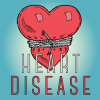Consulate Health Care wants to help increase healthy heart awareness by sharing some of the signs and symptoms of heart disease. These signs and symptoms vary widely depending on a patient’s heart condition, so below, we’ve listed the various heart conditions and some of the symptoms associated with each. You might also find it helpful to refer to Consulate’s patient education resource about Coronary Artery Disease.
Remember, it is always important to discuss any health care concerns with your physician.
Aneurysm
A small aneurysm may not cause any symptoms. It can be detected by X-ray, magnetic resonance imaging (MRI), or a computed tomography (CT) scan. Symptoms depend on the location of the aneurysm. For example, brain aneurysms can cause impaired vision and headaches. Or, there may be pain in the area of the aneurysm.
Arrhythmia (Irregular Heartbeat)
- Racing heartbeat
- Shortness of breath
- Chest pain
- Sluggish heartbeat
- Dizziness
- Blackouts
- Fatigue
Coronary Artery Disease
- Chest pain. When you are working out or stressed, you may feel tightness or squeezing in your chest under your breastbone like someone is stepping on it. Or, even if you aren’t exercising, you may feel a sharp, fleeting pain in your chest, abdomen, back or arm. This atypical chest pain is more common in women.
- Shortness of breath.
- Heart attack. Initial signs of an attack are usually a crushing pain in your chest, pain in your shoulder or arm, and shortness of breath. Women tend to experience additional warning signs of nausea or pain in the back and jaw.
Heart Attack In Men
- Discomfort in the middle of the chest. It can last from 30 minutes to two hours, or it can go away and return. The discomfort can feel like pressure, squeezing or a sense of heaviness or pain. It is not relieved by resting or taking nitroglycerin.
- Discomfort in one or both arms, between the shoulders on the back, in the neck, near the jaw or in the stomach.
- Shortness of breath or a feeling of not being able to get enough air. This can happen with or without chest discomfort.
- Nausea, vomiting, sweating, extreme fatigue or a feeling of light-headedness.
Heart Attack In Women
- Chest pressure, pain, or discomfort or a feeling that something is not right. These symptoms come and go.
- Pain localized to areas such as the arm, shoulder, jaw, stomach or back.
- Shortness of breath in the absence of pain.
- Nausea or passing out.
- These symptoms are even more of a concern if they grow worse with exertion or exercise.
Heart Disease In Adults
- Often there are no symptoms of cardiovascular disease until there is a problem.
- Chest discomfort or pain
- Extreme or unusual fatigue
- Faintness
- Lightheadedness
- Nausea
- Irregular heartbeat
Heart Disease In Children
- Extremely low blood pressure shortly after birth
- Blue coloration of the skin
- Heart murmur
- Breathing difficulties
- Feeding problems
- Poor weight gain
Heart Failure
- Blood and fluid buildup in the lungs (evident in frequent coughing or wheezing and/or blood-tinged phlegm.)
- Fluid buildup in the legs, ankles and feet.
- Sudden weight gain (3 pounds or more in a day, 5 pounds or more in a week.)
- Weight gain from fluid retention
- Fatigue
- Weakness
- Shortness of breath
- Rapid heartbeat
- Difficulty exercising
- Nausea
Stroke
- Weakness or numbness of the face, arm or leg, especially on only one side of the body.
- Confusion, trouble speaking or trouble understanding what others are saying.
- Difficulty seeing out of one or both eyes.
- Dizziness, difficulty walking or loss of balance.
- Severe headache.
Sudden Cardiac Arrest (Sudden Cardiac Death)
- Dizziness or a racing heartbeat can occur prior to a cardiac arrest.
- Loss of consciousness
- No respiration
- No heartbeat
Peripheral Arterial Disease
- Pain in your leg muscles during walking or other exercise, called claudication.
- Pain in your toes or the balls of your feet.
- Painful feet that feel better when they hang over the edge of the bed at night.
- Ulcers or sores on your feet, ankles or toes that will not heal.
- Toes that turn blue or black.
If you found an error, highlight it and press Shift + Enter or click here to inform us.



